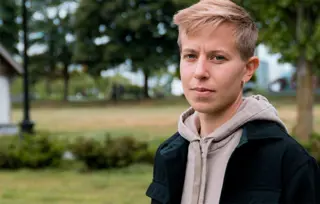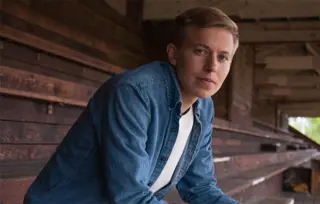Player Story
Quinn: “We need regulations to avoid discrimination of trans athletes”

- Quinn, who prefer to be addressed in plural, came out as a transgender over a year ago.
- They are playing for OL Reign in the NWSL and for the Canadian women’s national team.
- They noticed the difficulties trans players experience trying to play the game
Quinn came out as a transgender over a year ago. Until then, they were known as a woman. “Before coming out as trans, I always had this fear that no one would support me,” Quinn told FIFPRO.
“That was the thing I was most worried about. That my family wouldn’t be there to support me, that my friends wouldn’t accept me, and that the soccer community wouldn’t accept me and did not allow me to be in that space anymore.”
The opposite happened. Quinn experienced their coming out as “really positive”. “There is a support network around me and in the soccer community that I didn’t know existed before coming out. That’s been incredible.”
“Realizing that I had so many friends on my team who were going to continue to just treat me how I am, as Quinn, and seeing so much support from fans and people in my team environment like administrators or coaches is huge.”
Notwithstanding their positive coming-out experience, Quinn have great concerns about the possibilities for other transgender players.
“There have been instances with me playing, where I have been physically pushed out of spaces, even at half time not being allowed onto the field, having to have a coach or a teammate intervene in that situation.”
“That’s a difficult message being sent to me and to other trans folks: you’re not allowed in the space! That’s really hurtful.”

Quinn believe that stories like theirs are important in educating people and preventing transgender people from being alienated. “Education for people in the sports community for how we can make more inclusive environments. That can be from a team manager perspective of how to make a locker room and other spaces more inclusive. Or educating players on how their language can change or how they treat trans teammates. Those are huge components to making soccer spaces a lot more inclusive.”
“A huge component of playing sports well is being confident on the field. It was really hard for me to have confidence in my identity when I knew if other folks on my team didn’t accept me. It is really difficult to be in such an emotional environment, in terms of helping your teammates, going towards a collaborative goal when you have folks that aren’t validating your identity.”
Quinn explained how their national teammates made adjustments trying to make Quinn feel more safe and comfortable. “I can think of a little example. They brought me a different uniform, a man’s kit, without making a big deal out of it. Those little changes like showing up to my training session in my uniform, where I am feeling really good in, has made a huge impact of how I’m playing. I think I’ve been playing really well recently and a contributor to that is feeling really comfortable and good about myself.”
“I don’t think there is a reason for having such gendered uniforms. I know there are people who don’t identify as trans but who would be more comfortable wearing different uniforms.”

Access to sports needs to be secured, as Quinn have noticed the difficulties transgender players have getting into football. “Right now in the United States there are more laws trying to ban trans youth from sports than we’ve ever seen. We have kids dropping out from their Grade 4 sporting event because they’re being banned by state government. The impact that will have on those trans kids not being able to access the same opportunities as their friends, or the same spaces, or just even learn the simple lessons and joy that sports have to offer, will come at a huge cost.”
“Excluding kids from that joy will have a seriously detrimental impact. It will cost us lives.”
Quinn call on sports authorities to create policies that allow transgender athletes to participate in sports. “If there aren’t regulations on if a trans athlete can participate, or if they are made on a case-by-case basis, then this opens a lot of room for discrimination.”
Talking about the exclusion of kids and players make Quinn go through many emotions. They want to talk, they want to raise awareness, they want to pave the way for others.
“I didn’t see successful trans professional athletes on my television or social media.”
“Once I realised I was trans and wanted to continue a career in professional sports, I wanted to be that person for other folks who are trying to navigate themselves.”
“Now, being an out professional trans athlete, I am realising the barriers. Now I understand why there weren’t any role models for me. I want to change that, so that more athletes like me can become a role model.”
“I am not an anomaly to the situation. I can be a normal part in sports. That’s why this is really important to me.”
